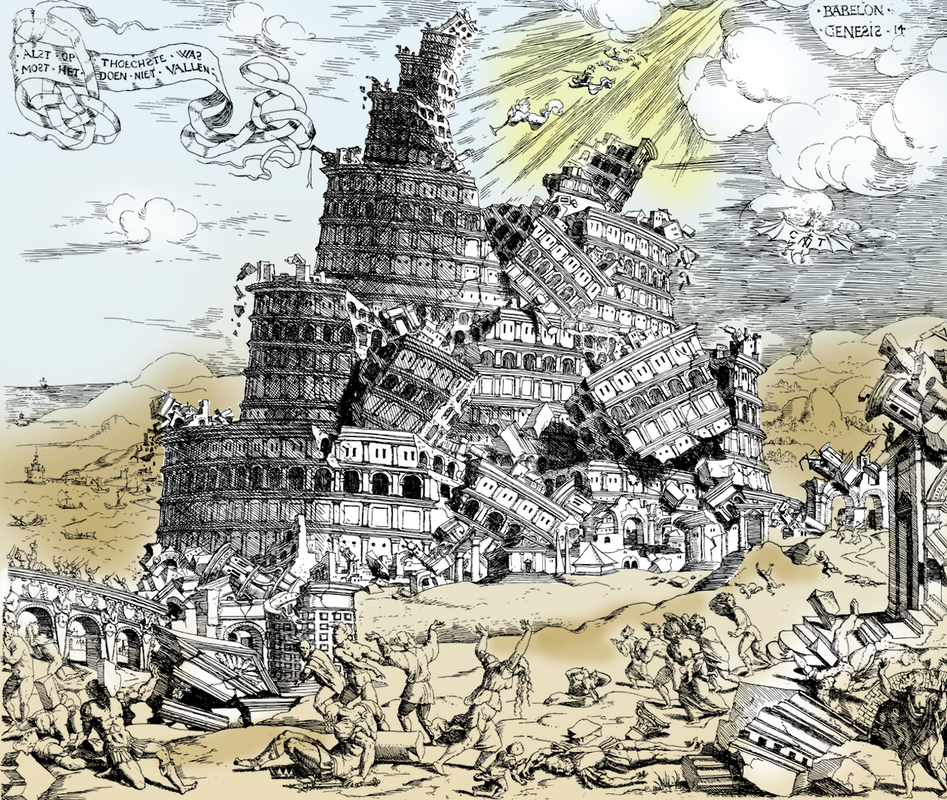|
Babel was a turning point in the Bible (Genesis 11:1-9). From there, Abraham came and changed the world. At Babel, God confused the languages of the people there, scattering them. Out of pride, they stopped glorifying God and sought to make a name for themselves (Genesis 11:4), and possibly make themselves equal to God (Genesis 3:4-5). But pride may not be the only reason for God’s intervention. Babel wasn’t just a tall building. Babel was also a city. Through language confusion, they stopped building the city (11:4,8). God called humans to fill the earth and multiple (Genesis 1:28; 9:1,7). But the people of Babel built the city so they wouldn’t be scattered over the face of the earth (11:4). They wanted to consolidate and strengthen their power. The city gave them a sense of security. We see similar events in Acts. Initially, the church in Jerusalem was warm and comfortable, with thousands converted. They were learning God’s words, fostering fellowship, eating together, sharing everything, and enjoying the favor of all the people. They could even communicate in different languages (Acts 2-4). But had they forgotten God telling them to spread the gospel to the ends of the earth? (Acts 1:8) Stephen’s speech in Acts 7 recounts Abraham leaving his homeland and changing the world; Joseph being exiled to Egypt, saving and growing the entire Israel tribe; the Israelites experiencing wonders in Egypt, like the splitting of Red Sea; and Moses receiving the laws at Mount Sinai and standing on a land God called holy ground. None of these events happened in Jerusalem. The focus shouldn’t be Jerusalem, their comfort zone; or their temple (God not dwelling in houses made by humans). After Stephen’s speech, great persecution scattered Christ’s followers throughout Judea and Samaria (Acts 8:1), Paul was transformed, and the gospel was widely spread (Acts 9). If we try to consolidate power and control our future with our ability, we will experience life like a little boat in a wild sea, violently tossed by huge and unpredictable waves. Don’t focus on your fragile security, name, influence, and power. Don’t focus on strengthening your power. Instead, forget ego and security. Trust that God controls everything and find peace in that. Offer yourselves to Him and be willing to be scattered to spread His glory. 巴别事件 巴别的出现是圣经的一个转折点(创世记 11:1-9)。 亚伯拉罕从那里而来,从此改变了世界。 上帝在巴别藉着变乱语言分散那里的人。他们出于骄傲,不再荣耀上帝,而是想为自己传扬名声(创世记11:4),或许期盼可以与上帝平等(创世记 3:4)。 但人的骄傲可能不是上帝干预的唯一原因. 巴别不仅仅是一栋高楼,也是一座城市。 那里的人因为语言混乱,停止建造这城 (创世记11:4,8)。 上帝呼召人遍满全地, 生养众多(创世记 1:28;9:1,7)。 但是巴别的人试图建造这城,使他们不会分散在地上(11:4)。 他们想巩固和加强自己的权力。 这城给了他们带来一种安全感。 我们在使徒行传中也看到类似的画面。 起初耶路撒冷的教会温暖而舒适,数以千计的人信主。 他们学习神的话,团契相交,一起吃饭, 凡物公用,得众人的喜爱。 他们甚至可以用不同的语言交流(使徒行传 2-4)。 但是,他们是否忘记了上帝托付他们要把福音传到地极的使命?(使徒行传 1:8) 司提反在使徒行传 7 章的演讲中复述了亚伯拉罕离开家园而改变世界; 约瑟被流放埃及而拯救并壮大整个以色列部落; 以色列人在埃及经历神迹奇事,例如红海分裂; 摩西在西奈山领受律法,站在上帝称为圣地的土地上。 这一切都没有发生在耶路撒冷。 注意力不应集中在他们的舒适区耶路撒冷或圣殿 (上帝并不住在人建造的房子里)。 司提反演讲后巨大的迫害使基督的追随者分散到整个犹大和撒马利亚(使徒行传 8:1),保罗信主生命被更新,福音被广传(使徒行传 9)。 如果我们试图用自己的能力去巩固权力,掌控自己的未来,就会经历到人生如同一艘小船,在茫茫大海中被狂风巨浪猛烈地抛掷撞击。 不要专注于自己脆弱的安全感、名誉感、影响力和权力。 不要专注于加强自己的力量. 相反地,忘记自我和安全感,相信上帝掌管一切,并在其中找到平安。 将自己献给祂,并愿意被祂差遣,四散全地传播祂的荣耀。
0 Comments
Leave a Reply. |
Categories
All
|
Proudly powered by Weebly
